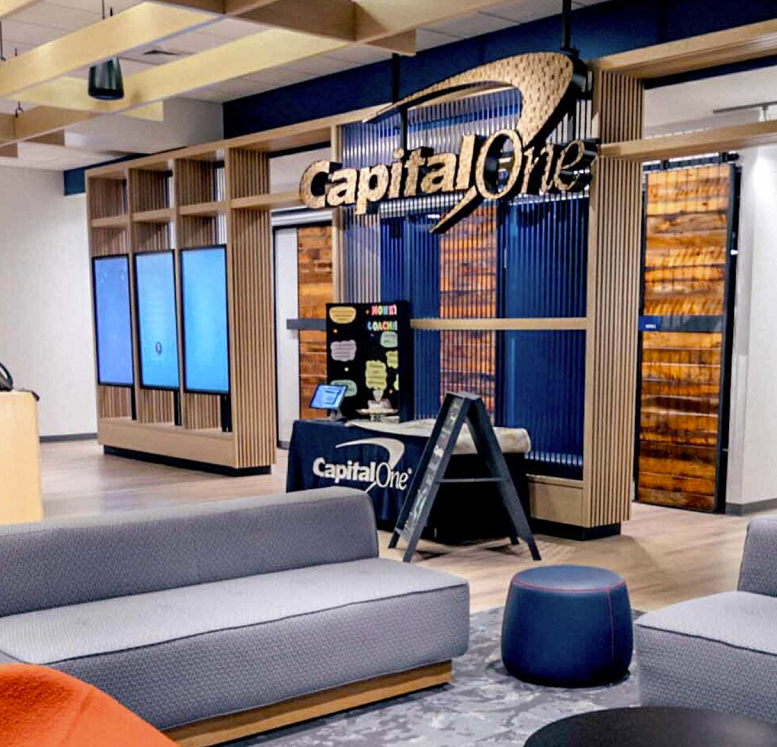Capital One is being sued by the Consumer Financial Protection Bureau for ‘cheating’ customers out of $2 billion in interest on their savings accounts, pitching their 360 Savings account years ago as high yield but adjusting interest rates down when the Fed did so, but not raising them when broader interest rates went up.
The product’s rate was as low as 0.30% last summer “even as the Federal Reserve raised rates above 5 percent.” Meanwhile, Capital One also offered the 360 Performance Savings account which had much higher rates. They didn’t proactively tell consumers to switch products. The CFPB pressed to get this lawsuit in under the wire before the second Trump administration comes into office.
Bloomberg‘s Matt Levine is incredulous. The whole business of banking is predicated on depositors not maximizing returns on their funds so that banks can earn a spread. He says that the basic problem underlying the 2023 banking crisis was that deposits have become more mobile, and that put institutions like Silicon Valley Bank at risk.
I’m sorry but the whole theory of banking, the basic core of how banking works, is that a lot of people don’t pay attention to the interest rate on their bank accounts, so banks can pay them below-market rates. This is not a minor peccadillo of nasty bankers; this is not a little malfeasance at the periphery of a basically customer-centric industry; this is not “oh those sneaky bankers, trying to keep deposit rates low even as the Fed raises rates.” This is what banking is. “Banks can keep deposit rates low even as the Fed raises rates” is why there is banking.

Capital One was supposed to reach out to customers and say “we have another product that pays you more for the same thing, do you want more?” That might have been nice for the customer but – as he says – “it’s bad banking!”
Capital One is not an adviser who is looking out for its depositors! It’s a bank! Its relationship with depositors is “we want to pay you a deposit rate that is low and insensitive to the market rate.” That is the very heart of the relationship. It’s not very nice, for you, if you’re the depositor. But that’s banking, man. If you are a depositor at a bank, you are not so much “a customer” as you are “raw material.” You are valuable to the extent you don’t pay attention. If they went out of their way to pay you a market rate on your deposits, they would not be a bank.

And regulators usually favor this arrangement, because they want banks to earn a strong return (and do so “at the expense of customers”) because that’s how they avoid failures that risk systemwide contagion.
[I]t’s hard to imagine a bank regulator, like the Fed, bringing a case like this. You suggest this case to the Fed and they will say things like “I don’t understand, of course the deposit beta is lower than 1, what is the problem.” “Only be reactive in offering a higher rate to depositors who aren’t complaining about their lower rate” is Banking 101. Going out and proactively calling depositors in low-rate accounts to switch them into higher-rate accounts is not just expensive for the bank; it is potentially destabilizing. Losing the cheap deposits — by telling the depositors that they’re cheap — is how banks fail. The Fed doesn’t want that.

CFPB doesn’t say Capital One lied to customers. It says they failed “to fulfill the consumer expectations it created” by pitching a savings account that was “high yield” at the time customers started but that isn’t anymore (and hadn’t been marketed that way since 2019).
The consumer regulatory agency wants consumers not to have to pay attention, though it’s not clear that what Capital One did was illegal, in fact it’s almost obligatory. In most contexts, consumers do have to pay attention to get the best deal, and their counterparties are not fiduciaries on their behalf.


Gary, methinks thou doth protest too much.
This will go away quickly next week. Trump won’t pursue it and he/DOGE have targeted CFPB for shutdown. This is a useless Elizabeth Warren created agency that is worthless and doesn’t understand apparently the core basis of business and capitalism. Also since when does government have to be the nanny for consumers. Ignorance and stupidity SHOULD be punished, not protected.
I hate to say it, but I am 100% on the side of the bank here. You know what the interest rate is. You see it every. single. month (if you check your balance). If you’re not happy with it, go someplace else. That is EXACTLY what I did — we had some money parked in their 360 account. They dropped the interest rate. We moved it someplace else.
For the love of God, people, take some personal responsibility!
How is this travel related?
I think it would be good to win this lawsuit. Have truth in advertising again. High yield should be high yield. Clear weather should be just that and not having airlines lie and say it was bad weather so they don’t have to put you up in a hotel when they didn’t get you to the transit airport on time for your second flight.
God Gary if you were glazing them any harder Richard Fairbank (lol) ‘s wife would be jealous. .30% is not “high yield” compared to anything except setting your money on fire or investing in Enron stock.
Capital One is not alone in this. GMAC / Ally played this game as well. What they do is every few years introduce a :”new product” with competitive rate a lower the rate on the “old product”. Hoping some money doesn’t move.
Its definitely only anti consumer, but it could be illegal if their marketing message said the account would be high yield, and then they kept the marketing message but did not keep it high yield.
The Biden administration dies. It believe in personal responsibility, borders, punishing criminals or two genders.
And they wonder why normal people won’t vote for them?
CFPB is a regulatory agency. What is the specific regulation(s) or laws that they are alleging was broken here? If “failing to fulfill customer expectations” was a violation, there wouldn’t be a financial institution left standing.
I get people may be upset when a “high-yield savings” account drops rates in sync with the fed, but then subsequently doesn’t raise them when the tide turns. But this seems more legally suited to a consumer law class action suit (if anything), than a regulatory action.
*does not believe
@Viewfromtheground (1) the accounts were relatively high yield 5 years ago (2) Capital One reduced payouts during ZIRP, 0.3% wasn’t bad when rates were zero, (3) they no longer market the accounts as high yield and didn’t adjust upward. If people don’t know they’re earning 0.3% when they can be earning 4%+, legally that seems on them and it’s certainly wise to be more proactive. Capital One never promised the accounts would be high yield forever, and stopped staying they were in 2019. Check in on your financial accounts every 5 years maybe?
Clearly this isn’t super consumer friendly, I’m just not clear how it’s fraudulent or otherwise-illegal.
The CFPB saved $30,000 for me when Coinbase refused to post a deposit that I made. They kept giving me the runaround for 6 months and I was at my wits end until I filed a complaint with the CFPB.
While I know that big bankers and their supporters hate the CFPB, there is a true reason why they hate it. It forces them to stop ripping people like me off.
Thank you CFPB for saving my $30k!!!! Anyone who is against the CFPB simply hasn’t been bit by these large banks yet – but you will be – and you’ll wish the CFPB still existed when you have zero recourse.
@david- no idea what you are talking about with Ally. Their main product has always been their “Savings Account”- I have had an account there for years and it has never changed names. The rate has always been competitive, although not quite at the very top of the market. They only have one savings product and one checking product. Right now the savings account is at 3.8%.
All banks play on the ignorant and inattentive. Grandma gets a nine month “special rate” CD advertised at 5% and doesn’t check the current specials when it matures so it renews at 1%.
Yes, yes, people should be aware of their financial status, but the way banks operate is sometimes just borderline unscrupulous.
About 6 years back I opened an “online only” Citibank savings account with a near 5% rate. All was great for the first 2 months, then over the next 3 months they dropped the APR to barely above 1%. The fine print said they could change the APR, but only 1% per month. Once they had a lot of accounts, they cut the APR as fast as possible and made it difficult to close accounts.
I could put the entire large deposit in there at one time via electronic transfer, but getting it back out was an entirely different story. To get my money out of Citibank, I had two choices. 1) Manually request something like $3,000 per month be electronically transferred out. 2) Go to any Citibank location in person and get a bank check issued. The nearest full service branch was Chicago, a nearly 3 hour flight. Traveling to a full service location would have negated any interest earned and potential future interest. Took almost a year to pry my money back out of Citibank. The ending APR was less than 0.5%. The cherry on top is that I still have that savings account with them. I cannot close it without going to a full service branch, but at least there are no bank fees.
We need a public option in banking. People should be able to deposit money directly with the fed and earn a transparent interest rate on their money indexed to the fed fund’s rate.
The biggest banks are essentially arms of the Fed already (to big to fail and whatnot) so why not cut out the middle man.
Personally, I’m vigilant, check my statements regularly, and caught this when I noticed the rate change (or lack thereof) with my account(s). I earned plenty on sign-up bonuses with Capital One (both credit cards and banking, savings, CDs), so net I feel I’m doing just fine, and it’s helped to cover some of travels around the world (which is why it is relevant for Gary to post on this, for those who prefer to attack him for silly reasons).
As for the CFPB, and the idea of government agencies, or government at all, yeah, I’m in favor of it. Sure, those ‘pesky regulations’ and ‘taxes’ do cause a lot of stress for some, but the baseline rules of ‘the game’ provide certainty and support for a healthy economy and actual competition, not regulatory capture by an oligarchy.
Yet, we’re going a different route now. Starting Monday, January 20, 2025, even those like me who preferred the ‘other team’ know very much that the ‘deregulation’ and ‘chaos’ that is coming will not be kind to most. This case will be withdrawn—we know. Or, at the very least, the slap on the wrist and onto the next scheme. One thing is for sure, never feel bad about ‘churning’ cards or accounts, because you are actually staying within the rules, even if it feels like you are receiving outsized benefits for those sign-up bonuses, only to close the card after a year. The banks and mega corporations do far worse to far more.
Sure, some of you will celebrate the suffering. I won’t. I don’t think it’s fun or clever to see average people get taken advantage of, regardless of whether I personally was able to insulate myself. I follow the ‘golden rule’ and would like to see people treated better, not scammed or taken advantage of, only to be told ‘it’s just business’ or it was their moral failure that resulted in the outcome. We can do better. We’re choosing not to. To me, that’s sad.
I guess we know what’s in their wallet.
Yup, I got caught as a long time ING customer into to CO. One day I saw the interest rate was greatly less than Ally and moved most of my CO savings over to Ally. It’s really not obvious except on earnings. Then later, I saw CO had an account that paid more than Ally – just like mine, only with a lot more interest, but I thought that was what I had? Like how could that be?? – I called them, confused…they thought nothing of my confusion on why my money got orphaned into a low paying account and then they changed my account into the higher interest one. One does have to be vigilant. I will reward Ally by closing my CO account as it wasn’t my imagination that CO was quietly cheating me. Was the act Criminal? no. Moral? also no. I will keep my credit card with them, at least until they quietly reduce point earning! I am only sadden as I know Dutch ING would never have done this. American CO did. Corporate America needs to find morality in their executive pay and bonuses.
They did this to me at Etrade Bank (Morgan Stanley) and US Bank as well.
@Omar
Now I keep any significant lose cash in Vanguard’s US Treasury Money Market. It pays the short term treasury rate (currently 4.3%) and the interest is mostly state tax exempt.
Rico’s call has been mine as well. There are several ultra low expense ETF options now which tie to fed rates. And if (as I am currently) you’re parking some money in a brokerage account in preparation for market dips this year, those are better options than a high rate savings account – one fewer click to deploy the funds to buy stocks that way.
I had one of these accounts. It didn’t really make a difference until a few years ago when interest rates started going up, then I think all in all I lost a decent chunk of money by not realizing this for a few months after that.
They never sent any notification to any existing customer. What bank offers two separate interest products? I have similar accounts at other banks, and no one else ever did anything like this. When I signed up, it was marketed as their high interest product, and they never sent me any indication otherwise. It was a pretty bad bait and switch.
What Karl Rupp said. I now work on keeping excess cash out of savings/checking and in my brokerage account with short-term laddered T-bills and/or CDs. I reliably beat “high yield” bank savings/checking accounts and don’t deal with the crap TXP (and others) referenced.
Well said 1990!